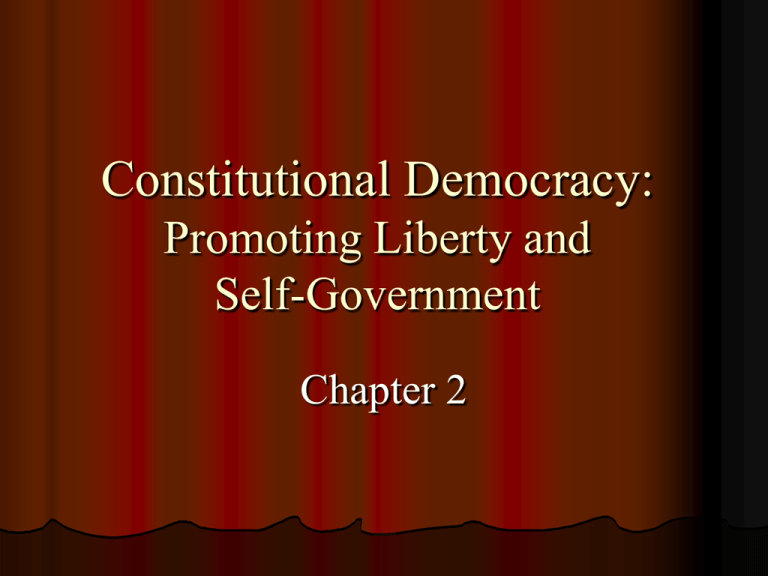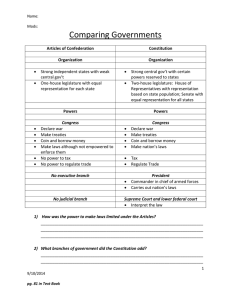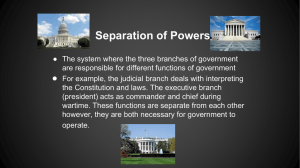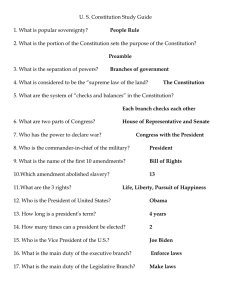
Constitutional Democracy:
Promoting Liberty and
Self-Government
Chapter 2
Before the Constitution: Colonial and
Revolutionary Experiences
The Rights of Englishmen
Rights including life, liberty and property to
which all people are entitled
Repeal of the Stamp Act: a tax on colonial
newspapers and document
Enactment of the Townsend Act: tax on tea
© 2009 McGraw-Hill Higher Education. All rights reserved.
2
Before the Constitution: Colonial and
Revolutionary Experiences
Declaration of Independence
call to revolution liberty, equality, individual
rights, self-government, lawful powers
John Locke: “Two Treatises of Government”
A
Inalienable (natural) rights: Life,
liberty, and property
Government has responsibility to preserve rights
Thomas
Jefferson:
“All
men are created equal”
Just powers derive from the consent of the governed
© 2009 McGraw-Hill Higher Education. All rights reserved.
3
Before the Constitution: Colonial and
Revolutionary Experiences
Articles of Confederation
Adopted
during the Revolutionary War
Created weak national government
States retained “sovereignty, freedom and
independence”
Prohibited Congress from interfering in states’
commerce policies
Prohibited Congress from taxation
© 2009 McGraw-Hill Higher Education. All rights reserved.
4
Before the Constitution: Colonial and
Revolutionary Experiences
Shays’s Rebellion
Raised
fears about the weakness of the national
government
Weakened Congress nation dissolving
Farmers, led by Daniel Shays, marched to prevent
foreclosures on their land
Congress unable to raise army to quell rebellion
Motivated Congress to authorize a convention in
Philadelphia to revise Articles of Confederation
© 2009 McGraw-Hill Higher Education. All rights reserved.
5
Negotiating Toward a Constitution
The Great Compromise
Virginia (large-state) Plan
Representation based on population number
Greater power to larger states
New Jersey (small-state) Plan
Each state would have one vote
Equal power to large and small states
Great Compromise: two-chamber Congress
House of Representatives: proportional representation
Senate: equal representation
© 2009 McGraw-Hill Higher Education. All rights reserved.
6
Negotiating Toward a Constitution
North-South compromise: the issue of slavery
Congress
agreed not to tax exports, only imports
Congress agreed not to outlaw slavery
Three-Fifths Compromise: three-fifths of enslaved
population counted for apportionment of taxes and
political representation
© 2009 McGraw-Hill Higher Education. All rights reserved.
7
Negotiating Toward a Constitution
A strategy for ratification
Constitution submitted
directly to the states
Federalists: proponents of the Constitution
Anti-Federalists: against a strong national
government
The Federalist Papers: Alexander Hamilton,
James Madison, John Jay
© 2009 McGraw-Hill Higher Education. All rights reserved.
8
Negotiating Toward a Constitution
The Framers’ goals
Government
strong enough to meet the country’s
needs
Government not threatening existence of the
separate states
Government not threatening liberty
Government based on popular consent
© 2009 McGraw-Hill Higher Education. All rights reserved.
9
Major Goals of The Framers of
the Constitution
© 2009 McGraw-Hill Higher Education. All rights reserved.
10
Protecting Liberty: Limited Government
Grants and denials of power
Grants:
Limit
government by stating specific powers in the
Constitution
Total of seventeen powers
Denials:
Limit
government by stating specific prohibitions in the
Constitution
Constitution difficult to amend
© 2009 McGraw-Hill Higher Education. All rights reserved.
11
Protecting Liberty: Limited Government
Sharing Power
Separation
of powers: divide the authority of the
government
Shared institutions checks & balances
Shared
legislative powers: Congress checked by the
President, Supreme Court
Shared executive powers: President checked by
Congress, Supreme Court
Shared judicial powers: Courts checked by the
President, Congress
© 2009 McGraw-Hill Higher Education. All rights reserved.
12
Protecting Liberty: Limited Government
Bill of Rights
First
ten amendments to Constitution
Protects rights of citizens, such as:
Freedom
of speech
Trial by jury of peers and legal counsel
Freedom of religion
Limits
power of government
© 2009 McGraw-Hill Higher Education. All rights reserved.
13
Protecting Liberty: Limited Government
Judicial Review
Courts
determine if governmental institution is
acting within its constitutional powers
Established by Chief Justice John Marshall in
Marbury v. Madison (1803)
© 2009 McGraw-Hill Higher Education. All rights reserved.
14
Providing for Self-Government
Democracy versus republic
People
rule, either directly or through elected
representatives
Majority rule is limited to protect minority rights
Limited popular rule
People
participate indirectly in process of
government through election of officials
Indirect election of president and (initially) Senators
Federal judiciary appointed, not elected
© 2009 McGraw-Hill Higher Education. All rights reserved.
15
Providing for Self-Government
Altering the Constitution
Jeffersonian
democracy
Government
Jacksonian
States
The
belonged to all, not just elite
democracy
give electoral votes to winner of the popular vote
Progressives
Direct
election of senators
Delegates carry out wishes of the voters
© 2009 McGraw-Hill Higher Education. All rights reserved.
16
Constitutional Democracy Today
Constitutional: provides for minority rights
and rule by law
Democracy: provides for majority influence
via elections
© 2009 McGraw-Hill Higher Education. All rights reserved.
17








